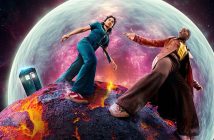2016 was a mixed bag at the cinema, with some huge disappointments (let’s not talk about Rogue One or Nocturnal Animals), as well as some fine work that deserves an honourable mention: Green Room, The Nice Guys, Hell or High Water and Paterson all impressed. But here are my ten best films of the year, from ten to one.
10. Victoria
Made in 2015, Victoria only made it to the UK in 2016, via Netflix. The sheer ‘how?’ of this film nudges it into the top ten. Victoria is a Spanish waitress (Laia Costa) in Berlin who meets some charming bad boys at the end of a night out, and joins an afterparty that escalates into drama and crime. Director Sebastian Schipper shot the whole movie in one take in the Kreuzberg and Mitte neighbourhoods of Berlin, with dialogue mainly improvised from a 12-page outline. The budget afforded them three attempts, the last of which was used. Although the plot is implausible in parts – this woman makes some really bad choices – the sheer kinesis and tension that build with the camera never leaving Victoria’s side serve to sweep us along breathlessly for the ride. It’s a nice reminder of the rewards available to directors willing to take risks; what if the prop guns didn’t fire? What if the car stalled? What if an actor messed up 90 minutes in? Schipper, Costa and the crew navigated the minefield artfully, and to gripping dramatic effect.
9. Swiss Army Man
We might look back on this decade as peak unoriginality, what with the sequels, reboots, prequels and comic book saturation we face at the cinema. In this context it’s hard to make something truly original; harder still with the one of the most recognisable franchise-carrying faces of all time fronting it. Swiss Army Man made it look easy, though it was certainly divisive. Filmed in three weeks by first-time directors Daniel Scheinert and Daniel Kwan, the story was just too odd for some early audiences: Paul Dano’s suicidal castaway Hank finds a dead body, Manny (Daniel Radcliffe), whose magical powers he uses to find his way home. Those powers involve a lot of flatulence and dick jokes, but it’s not at all cheap; instead it’s an odd, charming, funny and uplifting buddy movie featuring Harry Potter’s dead erection. What’s not to love!

8. Bone Tomahawk
It’s been six months and I still wake up thinking about this, a slow-burn western horror in which Sheriff Kurt Russell and foreman Patrick Wilson set out with a small posse to rescue the latter’s wife from cave-dwelling cannibals. The first 90 minutes of low-key dialogue and determined travelling just serve to wind up the tension, almost imperceptibly, to the point that when the arrows and tomahawks start to fly and the real horrors unfold, you couldn’t tear your eyes away even if you wanted to. And you may well want to, as this film contains ‘The Scene’, as a friend dubbed it – certainly the most memorable death I’ve seen in recent years. This was S. Craig Zahler’s first time in the director’s chair, a breathtaking debut made for just $1.8m. Be afraid, but do not miss it.
7. Divines
Uda Benyamina’s Divines was another pulsating debut in a year of fine work from first-time directors. Dounia (Oulaya Amamra, the director’s sister, outstanding in the lead role) and her best friend Maimouna (Deborah Lukumuena) hustle for money and status in the slums of Paris, and befriend a dangerous local drug dealer, Rebecca (Jisca Kalvanda), to ‘get rich or die trying’, as they put it. Dounia resolves to work her way up and make enough money to rescue herself and her mother from their circumstances, but her determination puts herself, as well as her friends and family, at risk. Benyamina won the Camera d’Or for the best first feature at Cannes, and it’s a pacy, intoxicating buddy movie for the most part. Stretches of the film are shot with mobile phones, and Snapchat even makes its French cinematic debut, making it feel like an authentic teens-eye view of banlieue life. However, Benyamina doesn’t shy away from delivering the emotional gut punches that elevate Divines above thematically similar, but less satisfying recent films like Girlhood.

6. A Bigger Splash
I wonder if Ralph Fiennes’ Potter contract precluded him from taking roles like Harry, the obnoxious, nude-dancing record producer who runs away with A Bigger Splash. Luca Guadagnino directed this remake of Jacques Deray’s La Piscine, in which holidaying rock star Marianne (Tilda Swinton) and her partner Paul (Matthias Schoenaerts) have their seclusion shattered by a surprise visit from her ex, Harry (Fiennes) and his teenage daughter Penelope (Dakota Fanning). All four do their best to destabilise Marianne and Paul’s relationship, which isn’t as solid as it seems, with inevitable fireworks. Harry’s convulsive and repulsive dance to Emotional Rescue is a particular highlight, second only to that other Ralph Fiennes scene in terms of laughs this year. Guadagnino handles the psychodrama elegantly and confidently – we look forward to his forthcoming remake of demented Argento ballet classic Suspiria, also starring Swinton and Johnson.
5. 13th
Ava DuVernay’s incendiary documentary was slightly hamstrung by its immediate move to Netflix – it’s hard enough competing with 6-10 other films at a cinema, never mind thousands of movies and TV shows available on demand. Nonetheless it’s an essential piece of work, unflinchingly chronicling the false dawn heralded by the emancipation proclamation, and the systemic and cultural strictures which kept white supremacy firmly at the root of American society and justice for the century that followed. The inter-cutting of candidate Donald Trump’s calls for a return to ‘the good old days’ with footage of the daily horror that those ‘good old days’ inflicted on African Americans should have been a rueful footnote. Instead, with his election, the clarion call for decency and equality has never sounded louder, nor needed more desperately to be heard.

4. Elle
Paul Verhoeven’s wildly provocative home invasion rape revenge thriller is not an easy sell; it divided critics at the time, and I sympathise entirely with friends who found the iterated sexual violence just too gratuitous. However, if you can stick with it, this is an exceptional and original piece of work, anchored and indeed made possible by a stunning turn from Isabelle Huppert as Michele. Inscrutable, ruthless and cold, she reacts to a horrendous assault by cleaning things up and generally getting on with her life. Genre tropes are set up, confronted, and then totally ignored as Verhoeven and Huppert take us off in a different direction entirely, as Michele tries to work out her attacker’s identity, as well as fleshing out the traumatic events from her childhood that explain, but never excuse, her actions. It’s not for the faint of heart but trust me, you’ve never seen anything quite like it.
3. The Handmaiden
Park Chan-Wook is a proper auteur – not one of those juvenile Tarantino/Winding Refn ones – and when he’s on song like he is with The Handmaiden there are very few who can compete. This is an erotic thriller, inspired by Welsh novel Fingersmith, about a con artist trying to swindle a neglected Japanese heiress out of her fortune. The actors are superb, particularly Kim Tae-ri as naive handmaiden Sook-hee and Kim Min-hee as the mark, Lady Hideko; but the real star is Chan-Wook himself. Watching him lay out and manipulate his story is like watching a virtuoso concert pianist; the level of precision and control in every single frame is staggering, and although its run-time is a chunky 145 minutes, nothing feels particularly indulgent. The period design is casually exquisite, bagging the technical prize at Cannes for art director Ryu Seong-hie. It should take something truly extraordinary to beat this to the Best Foreign Film category at the 2017 Oscars. Park Chan-Wook and Tarantino are the same age and both are enormously talented; one’s films are getting better and better, whereas Quentin is going … the other way.

2. The Witch
Dost thou want to explore gender roles deliciously? Robert Eggers’ tremendous debut feature generated early buzz based solely on a marvellous trailer that made the film look like a fusion of high art and abject terror. The final film is a little more accessible than that, but it absolutely delivered on the hype. The Witch is the story of a small family of settlers in New England who leave a puritanical community to live in isolation at the edge of a secluded forest. The family, father William (Ralph Ineson), mother Katherine (Kate Dickie), daughter Thomasin (Anya Taylor-Joy), son Caleb (Harvey Scrimshaw) and twins Mercy and Jonas (Ellie Grainger and Lucas Dawson), build a new farm and welcome the arrival of baby Samuel. When the newborn vanishes, suspicion falls on Thomasin, who struggles to placate her devastated mother, while the family desperately searches the woods for Samuel.
The film explores gender roles, patriarchal family structures and the power of faith intelligently; it’s also straight-up terrifying, with visuals and an oppressive sense of dread that belie its $3m budget. Ralph Ineson and Kate Dickie are terrific as the struggling parents, but Anya Taylor-Joy is an absolute revelation and if there’s any justice in the world, she’ll become a gargantuan star. She’s since impressed in Morgan and will star in M Night Shyamalan’s next horror, Split. Robert Eggers is just 33 years old and is scheduled to remake Nosferatu next. I’m scared already.
1. Moonlight
Moonlight had a decent run at various UK festivals and its rights were ultimately acquired by Altitude, who intend to release it more widely in the UK for a BAFTA push in February. The film was written and directed by Barry Jenkins, based on Tarell Alvin McCraney’s play, In Moonlight Black Boys Look Blue. It comprises three chapters in the life of Chiron, a withdrawn child with an emotionally abusive mother, who struggles to come to terms with his identity and sexuality. Three different actors (Alex Hibbert, Ashton Sanders and Trevante Rhodes) play Chiron at different stages of his life, opposite his friend Kevin (Jaden Piner, Jharrel Jerome and Andre Holland). Mahershala Ali plays Juan, a drug dealer who befriends and protects Chiron; Naomie Harris plays Chiron’s mother, somehow filming her entire part in three days during the Spectre press tour; and Janelle Monae plays Juan’s girlfriend Teresa, who supports Chiron where his mother can’t.

By this point in a top ten I’ve used most of the superlatives I can remember but it’s hard to put into words what a beautiful and unique film Moonlight is. It feels intensely personal – the director tried to use locations from his own life, and the dialogue and lack thereof in parts is devastating in its understatement at times. But at the same time, for a film derived very obviously from a play, it’s gorgeously cinematic; DP James Laxton shot in widescreen CinemaScope and worked with a colourist, Alex Bickel, in order to give each chapter a different visual asthetic, imitating classic film stocks from Fuji, Afga and Kodak. It shimmers.
Jenkins also made sure the actors playing Chiron never met, to make sure they took their cues from the script and director, rather than imitating each other. It has the effect of creating three fully-formed characters who stand on their own, yet are quite clearly drawn from the same well. Nominations and wins are rolling in the cast, with Ali and Harris particularly favoured in the early running, but the whole film rests on the delicate (and later hulking) shoulders of Chiron’s actors, and they are all magnificent. There just aren’t cinematic archetypes to follow for these roles, and the cast and director’s faith in each other is rewarded with astonishing performances.
Brokeback Mountain made waves when it won a Best Director Oscar for Ang Lee, as the industry wasn’t sure if it was ready for a gay western. I wasn’t particularly reserved in my criticisms of the Hollywood establishment’s bare-faced lack of diversity when last year’s Oscar nominations came out; perhaps the fact that one of this year’s awards front-runners is a gay coming-of-age drama with an entirely black cast and creative team is a sign that a corner has been turned. The very fact that such a film still raises eyebrows suggests not. A film like this shouldn’t be so hard to get made, and so late in arriving, but arrived it has. Gorgeous to look at, spellbindingly acted, heartbreaking and uplifting, Moonlight is the best film I saw this year.
… and the worst?

2016 was not a banner year for blockbusters. Batman vs Superman: Dawn of Justice was confused and confusing; Gods of Egypt was head-bangingly terrible; the Jason Bourne revival seemed to be a waste of everyone’s time. But without a doubt, the most inexcusable turkey of 2016 was Suicide Squad. The DC cinematic universe got off to a terribly self-important start and it was generally agreed that it needed more levity to compete with Marvel’s team of hit-makers. Why, then, bring in David Ayer, famed comedy director of such military and gun fetishisation flicks End of Watch and Fury? Not to mention an inability to deal with female characters that rivals master of the art Aaron Sorkin. Add to the mix charisma-vacuums Jai Courtney and Joel Kinnaman and you’ve got a project that seems, well, suicidal. Ayer had six weeks to write the script to meet production deadlines and it shows; what little plot there is makes little sense and is a boring retread of a bunch of other films in any case. Jared Leto’s joker was hyped into oblivion and left largely on the cutting room floor, which was probably a blessing as he’s almost as annoying as Jesse Eisenberg’s Lex Luthor in Batman vs Superman. DC are going to have to spend an awful lot of money and an awful lot of our time to dig themselves out of this hole. I’m not sure it’ll be worth it.




